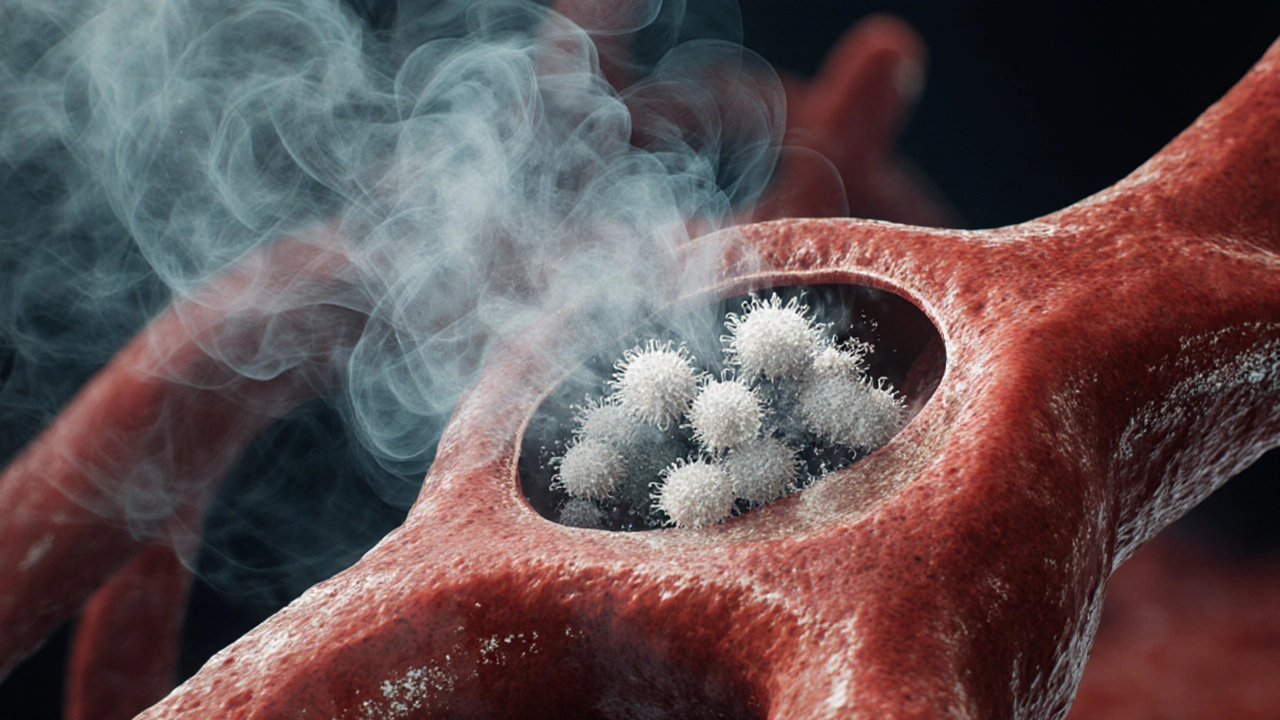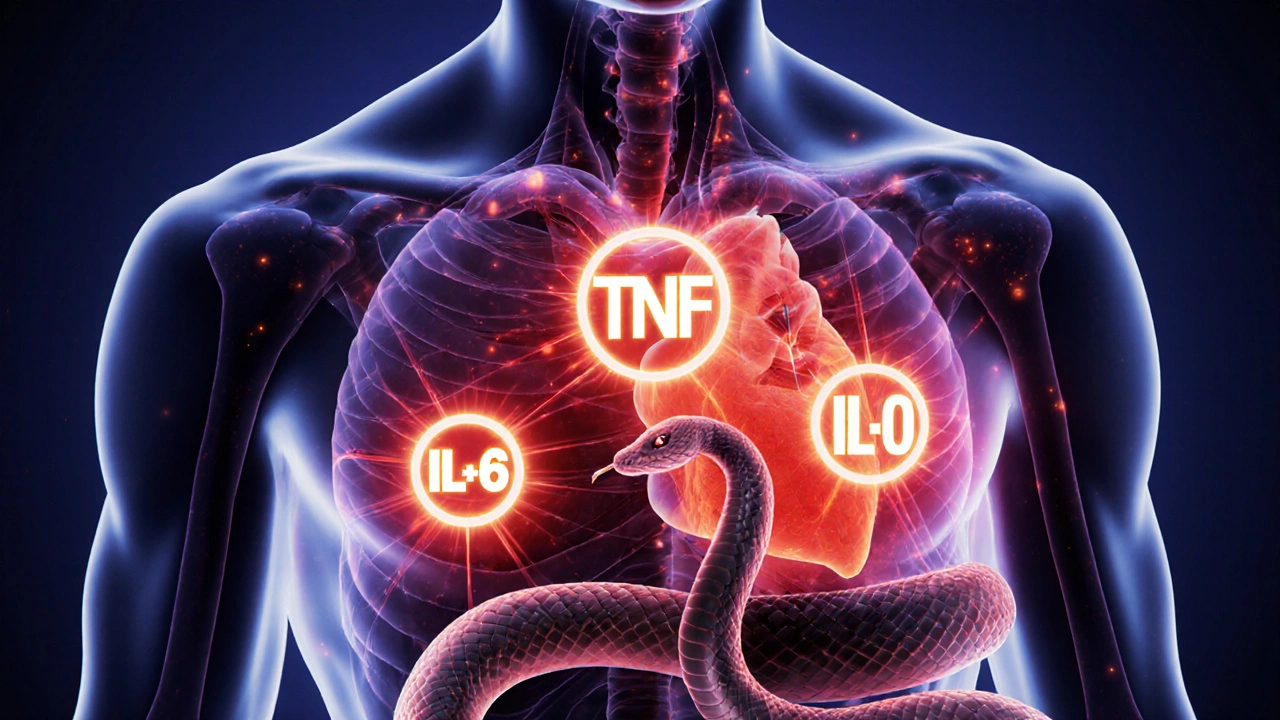How Smoking Weakens Your Immune System
 Oct, 3 2025
Oct, 3 2025
Immune System Impact Calculator
Your Immune System Impact
Neutrophil Function
Chemotaxis efficiency:
Antibody Production
IgG Levels: g/L
Inflammation Level
IL-6 Level: pg/mL
Oxidative Stress
Stress Index:
Recovery Timeline
Ever wonder why a simple cough after a night out can linger for days? The answer lies in a hidden battle between the chemicals you inhale and the body's natural defense army. The link between smoking and immune system function is clear: each puff chips away at the cells that keep you healthy.
- Smoking injects toxins that impair white‑blood‑cell activity.
- Nicotine disrupts cytokine signaling, raising chronic inflammation.
- Oxidative stress from smoke reduces antibody production.
- These changes make infections, slower wound healing, and chronic disease more likely.
- Quitting gradually restores immune competence, often within weeks.
How Smoking Targets Immune Cells
When you light up, Smoking is a behavior that forces thousands of chemicals, including nicotine, tar, and carbon monoxide, into the lungs and bloodstream. Those chemicals travel to the bone marrow, where blood cells are born, and directly affect the Immune system is the collection of organs, cells, and proteins that protect the body from pathogens. The first line of defense-White blood cells are mobile defenders that locate and destroy invading microbes-starts to falter. Studies from the British Heart Foundation in 2024 showed a 30% drop in neutrophil (a type of white blood cell) chemotaxis among daily smokers compared with non‑smokers. In plain terms, the cells move slower and miss more targets.
Nicotine’s Sneaky Role in Inflammation
Nicotine, the addictive alkaloid most associated with cigarettes, isn’t just a mood‑altering drug. It also hijacks the body’s Cytokines are signaling proteins that modulate the intensity and duration of immune reactions. Nicotine binds to nicotinic acetylcholine receptors on immune cells, skewing the balance toward pro‑inflammatory cytokines like IL‑6 and TNF‑α while suppressing anti‑inflammatory ones such as IL‑10. The result is a chronic low‑grade inflammatory state. Think of it as a fire alarm that never turns off; the body expends energy on inflammation rather than on fighting real infections. A 2023 meta‑analysis of 67 cohorts linked nicotine‑driven inflammation to a 1.8‑fold increase in severe influenza complications.
Oxidative Stress Undermines Antibody Production
Every puff also delivers free radicals that cause Oxidative stress is an imbalance between reactive oxygen species and the body’s antioxidant defenses. This stress attacks the DNA of B‑cells, the lymphocytes that manufacture Antibodies are Y‑shaped proteins that specifically bind to foreign invaders. When B‑cells are damaged, the quantity and quality of antibodies drop.
A 2022 trial at the University of Bristol measured IgG levels in 150 participants and found that smokers had, on average, 22% lower IgG concentrations than never‑smokers. Lower antibodies mean the body is slower to recognize and neutralize viruses, bacteria, and even cancer‑related antigens.

Real‑World Health Outcomes
The lab data translate into concrete health risks:
- Respiratory infections: Smokers are twice as likely to develop pneumonia after a cold.
- Delayed wound healing: Post‑surgical patients who smoke experience a 40% longer recovery period.
- Autoimmune flare‑ups: Conditions like rheumatoid arthritis show higher disease activity scores among smokers.
- Cancer susceptibility: Impaired immune surveillance heightens the chance that mutated cells escape detection.
Even if you think you’re only a “social smoker,” the cumulative effect adds up. A 2025 longitudinal study from Public Health England tracked occasional smokers and found that after 10years, their risk of chronic bronchitis matched that of daily smokers.
Quitting: How the Body Bounces Back
Good news: the immune system is remarkably resilient. Within 24hours of the last cigarette, carbon monoxide levels normalize, allowing oxygen to reach tissues more efficiently. Over the next 2‑4weeks, neutrophil function improves by up to 20%. At the 3‑month mark, B‑cell counts start to recover, and antibody levels rise toward baseline. By one year, former smokers have a risk profile for respiratory infections that mirrors never‑smokers, according to NHS data. To support this recovery, combine cessation with:
- VitaminC andE supplements (antioxidants that counteract oxidative stress).
- Probiotic‑rich foods that nurture gut‑associated lymphoid tissue.
- Regular moderate exercise, which boosts circulation of immune cells.
- Adequate sleep-7‑9hours per night-to allow cytokine regulation.
These habits accelerate the return to a robust immune defense.
Quick Checklist: Protecting Your Immunity
- Stop smoking today - use nicotine‑replacement or prescription aids if needed.
- Eat a colorful diet rich in antioxidants (berries, leafy greens, nuts).
- Stay hydrated - water helps flush toxins that impair immune cells.
- Exercise 150minutes per week - improves white‑blood‑cell circulation.
- Get a flu shot - reduces the burden on a recovering immune system.
- Monitor lung health - schedule a spirometry test six months after quitting.
| Marker | Smokers (average) | Non‑smokers (average) |
|---|---|---|
| Neutrophil chemotaxis | 0.7× baseline | 1.0× baseline |
| IgG concentration (g/L) | 9.8 | 12.6 |
| IL‑6 (pg/mL) | 4.2 | 2.3 |
| Oxidative‑stress index | 1.9 | 1.0 |
Frequently Asked Questions
Can occasional smoking still harm the immune system?
Yes. Even low‑frequency exposure introduces toxins that alter white‑blood‑cell function. Studies show occasional smokers have measurable reductions in antibody levels after just six months of use.
How long does it take for immune function to recover after quitting?
Most improvements appear within the first month, with neutrophil activity returning to near‑normal. Full recovery of antibody production can take 3‑12months, depending on age and overall health.
Are e‑cigarettes any better for immunity?
E‑cigarettes still deliver nicotine and a host of aldehydes that provoke inflammation. While they lack some of the tar‑related toxins, they do not fully protect immune cells and should not be considered a safe alternative.
What nutrients help rebuild a weakened immune system?
VitaminC, vitaminD, zinc, and selenium are key. Antioxidant‑rich foods (berries, citrus, nuts) also combat oxidative stress caused by past smoking.
Does smoking increase the risk of autoimmune diseases?
Yes. The chronic inflammation and altered cytokine profile triggered by nicotine can tip the immune balance toward autoimmunity, raising the incidence of rheumatoid arthritis and multiple sclerosis among smokers.
Jimmy Gammell
October 3, 2025 AT 05:57I’ve been trying to quit for a year now and this little calculator actually helped me see the numbers behind my cravings :) It’s wild how quickly neutrophil function can bounce back after a few months without smoke. Keep pushing, every day counts. Remember, the immune system is tougher than you think!
fred warner
October 4, 2025 AT 23:37Absolutely, the data you shared aligns with clinical observations; immune parameters tend to normalize within weeks of cessation. It’s encouraging to see quantifiable improvements, especially in neutrophil activity and IgG levels. Stay consistent and you’ll notice the benefits manifesting both physiologically and subjectively.
Veronica Mayfair
October 6, 2025 AT 17:17Yo this tool is lit 🔥 I love that you can actually see your own immune stats change. The colors and progress bars make it super easy to track, even if you’re not a science nerd. Hope more peeps try it and ditch the habit!
Rahul Kr
October 8, 2025 AT 10:57Interesting read. The gradual recovery rates make sense when you consider oxidative stress reduction over time.
Anthony Coppedge
October 10, 2025 AT 04:37From a grammatical standpoint, the article does a solid job of presenting data, however, a few commas could improve readability, especially in the sections describing the recovery rates; the flow would benefit from clearer clause separation, which in turn would make the scientific explanations more digestible for lay readers.
Joshua Logronio
October 11, 2025 AT 22:17Did you ever notice how tobacco companies fund a lot of “research” that downplays these immune impacts? It’s all part of the grand scheme to keep us addicted while pretending they’re concerned about health. Stay woke.
Nicholas Blackburn
October 13, 2025 AT 15:57Wow, another conspiracy tangent. Let’s focus on the actual data instead of chasing ghosts. The numbers speak for themselves, and the science is solid-no hidden agenda needed to prove smoking harms immunity.
Dave Barnes
October 15, 2025 AT 09:37One could argue that the act of calculating our own health metrics borders on existential self‑examination; we become both observers and participants in the narrative of decay and renewal. Yet, the pragmatic side remains: knowing is the first step to changing.
Kai Röder
October 17, 2025 AT 03:17It’s essential to approach this topic with both empathy and evidence. While personal stories are powerful, the aggregate data underscores a universal truth: smoking compromises immune defenses, and quitting restores them over measurable time frames. Let’s keep the conversation grounded in facts.
Brandi Thompson
October 18, 2025 AT 20:57When we peel back the layers of public health messaging surrounding tobacco consumption we uncover a tapestry woven from threads of corporate influence, cultural normalization, and individual vulnerability. The immune system, a marvel of evolutionary engineering, bears the brunt of chronic exposure to the myriad toxins present in smoke, from nicotine to tar and a legion of carcinogenic compounds. Neutrophil chemotaxis, a frontline defense mechanism, becomes sluggish, compromising the body’s ability to swiftly respond to bacterial invasions. Antibody production, particularly IgG, suffers a quantifiable dip, leaving the host more exposed to viral pathogens. Inflammatory markers such as interleukin‑6 rise, painting a picture of chronic low‑grade inflammation that fuels a cascade of downstream health issues. Oxidative stress, the silent saboteur, gnaws at cellular membranes, DNA, and mitochondrial function, accelerating the aging process itself. The calculator presented in this piece does more than merely assign numbers; it visualizes the trajectory of recovery, reminding us that cessation initiates a reparative cascade. Within days, the body begins to clear carbon monoxide, allowing oxygen transport to rebound. Weeks bring a resurgence in ciliary activity, clearing the airways of debris. Months see a gradual rebalancing of cytokine profiles as the inflammatory milieu subsides. Years of abstinence can restore immune parameters to near‑baseline levels, though some epigenetic scars may linger. Understanding this timeline empowers individuals to set realistic expectations, fostering adherence to cessation programs. Moreover, it underscores the importance of early intervention: the sooner the habit is broken, the shorter the road to immunological redemption. Public health policies must therefore prioritize education that demystifies these processes, moving beyond scare tactics to actionable insight. In the grander scheme, a population with a robust immune system translates to reduced healthcare burdens, fewer hospitalizations, and a more resilient society. The data, therefore, is not merely academic; it is a clarion call to rewrite the narrative of smoking from a socially sanctioned pastime to a recognized immunological toxin.
Chip Hutchison
October 20, 2025 AT 14:37That was a thorough breakdown; thanks for pulling everything together. It really puts the recovery timeline into perspective and shows why quitting sooner is so beneficial.
Emily Moody
October 22, 2025 AT 08:17Smoking is a betrayal of our nation’s strength and purity.
Tim Ferguson
October 24, 2025 AT 01:57Sure, but isn’t it also true that moderate smokers sometimes claim they feel more focused? Maybe the data isn’t the whole story.
Noah Cokelaere
October 25, 2025 AT 19:37Oh great, another “miracle calculator” that tells you how long it takes to feel less like a hamster on a wheel. Yeah, because we all have the time to sit and watch numbers crash.
Ashley Helton
October 27, 2025 AT 12:17Haha, love the sarcasm-if only the numbers could also calculate the amount of coffee we need to survive the cravings.
Brian Jones
October 29, 2025 AT 05:57All jokes aside, the calculator gives concrete milestones. Celebrate the small wins, like a drop in IL‑6 after a week, and keep the momentum going.
Carlise Pretorius
October 30, 2025 AT 23:37nice info thx
Johnson Elijah
November 1, 2025 AT 17:17Let’s keep the conversation going! 🌟 Every step toward quitting is a victory, and we’re all here to cheer you on! 💪🏽🚭
Ellie Haynal
November 3, 2025 AT 10:57It’s morally indefensible to willingly poison your own body and, by extension, jeopardize public health. The selfish act of smoking not only harms the individual but also burdens the collective with preventable disease. Choose responsibility over addiction.